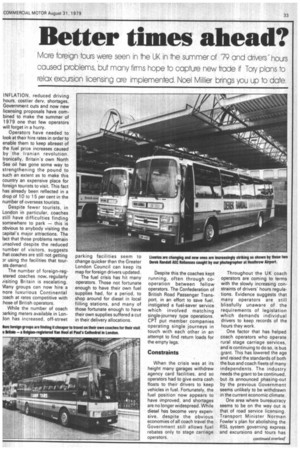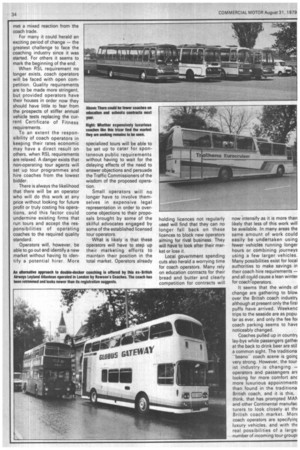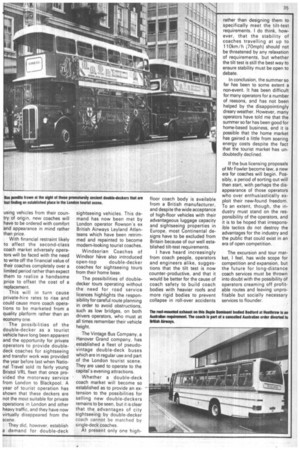Better times ahead?
Page 35

Page 36

Page 37

If you've noticed an error in this article please click here to report it so we can fix it.
More foreign tours were seen in e UK in ne summer of 79 and drivershours caused problems, but many firms hope to capture new trade if Tory plans to relax excursion licensing are implemented. Noel Millier brings you up to date.
INFLATION, reduced driving hours, costlier derv, shortages, Government cuts and now new licensing proposals have combined to make the summer of 1 979 one that few operators will forget in a hurry.
Operators have needed to look at their hire rates in order to enable them to keep abreast of the fuel price increases caused by the Iranian revolution. Ironically, Britain's own North Sea oil has gone some way to strengthening the pound to such an extent as to make this country an expensive place for foreign tourists to visit. This fact has already been reflected in a drop of 10 to 15 per cent in the number of overseas tourists.
Despite fewer tourists, in London in particular, coaches still have difficulties finding somewhere to park — this is obvious to anybody visiting the capital's major attractions. The fact that these problems remain insolved despite the reduced lumber of visitors, suggests :hat coaches are still not getting or using the facilities that toursts demand.
The number of foreign-regstered coaches now. regularly Asiting Britain is escalating. Many groups can now hire a nore luxurious Continental ;oach at rates competitive with :hose of British operators.
While the number of coach oarking meters available in Lonion has increased, off-street parking facilities seem to change quicker than the Greater London Council can keep its map for foreign drivers updated.
The fuel crisis has hit many operators. Those not fortunate enough to have their own fuel supplies had, for a period, to shop around for diesel in local filling stations, and many of those fortunate enough to have their own supplies suffered a cut in their delivery allocations. Despite this the coaches kept running, often through cooperation between fellow operators. The Confederation of British Road Passenger Transport, in an effort to save fuel, instigated a fuel-saver service which involved matching single-journey type operations. CPT put member companies operating single journeys in touch with each other in an attempt to find return loads for the empty legs.
Constraints
When the crisis was at its height many garages withdrew agency card facilities, and so operators had to give extra cash. floats to their drivers to keep vehicles in fuel. Fortunately, the fuel position now appears to have improved, and shortages are no longer widespread. While diesel has become very expensive, despite the obvious economies of all coach travel the Government still allows fuel rebates only to stage carriage operators. Throughout the UK coach operators are coming to terms with the slowly increasing constraints of drivers' hours regulations. Evidence suggests that many operators are still blissfully unaware of the requirements of legislation which demands individual drivers to keep records of the hours they work.
One factor that has helped coach operators who operate rural stage carriage services, and is continuing to do so, is bus grant. This has lowered the age and raised the standards of both the bus and coach fleets of many independents. The industry needs the grant to be continued, but its announced phasing-out by the previous Government seems unlikely to be withdrawn in the current economic climate.
One area where bureaucracy seems to be on the way out is that of road service licensing. Transport Minister Norman Fowler's plan for abolishing the RSL system governing express and excursions and tours has met a mixed reaction from the coach trade.
For many it could herald an exciting period of change — the greatest challenge to face the coaching industry since it was started. For others it seems to mark the beginning of the end.
When RSL requirement no longer exists, coach operators will be faced with open competition. Quality requirements are to be made more stringent, but provided operators have their houses in order now they should have little to fear from the prospects of stiffer annual vehicle tests replacing the current Certificate of Fitness requirements.
To an extent the responsibility of coach operators in keeping their rates economic may have a direct result on others, when RSL requirements are relaxed. A danger exists that non-operating tour agents will set up tour programmes and hire coaches from the lowest bidder.
There is always the likelihood that there will be an operator who will do this work at any price without looking for future profit or truly costing his operations, and this factor could undermine existing firms that run tours and accept the responsibilities of operating coaches to the required quality standard.
Operators will, however, be able to go out and identify a new market without having to identify a potential hirer. More specialized tours will be able to be set up to cater for spontaneous public requirements without having to wait for the delaying effects of the need to answer objections and persuade the Traffic Commissioners of the wisdom of the proposed operation.
Small operators will no longer have to involve themselves in expensive legal representation in order to overcome objections to their proposals brought by some of the skilful advocates engaged by some of the established licensed tour operators.
What is likely is that these operators will have to step up their marketing efforts to maintain their position in the total market. Operators already holding licences not regularly used will find that they can no longer fall back on these licences to block new operators aiming for rival business. They will have to look after their market or lose it.
Local government spending cuts also herald a worrying time for coach operators. Many rely on education contracts for their bread and butter and clearly competition for contracts will now intensify as it is more than likely that less of this work will be available. In many areas the same amount of work could easily be undertaken using fewer vehicles running longer hours or combining journeys using a few larger vehicles. Many possibilities exist for local authorities to make savings in their coach hire requirements — and all could cause a lean winter for coach operators.
It seems that the winds oi change are gathering to blovi. over the British coach industry although at present only the firsi puffs have arrived. Weekenc trips to the seaside are as popular as ever, and only the fee foi coach parking seems to have noticeably changed.
Coaches pulled up in country lay-bys while passengers gathei at the back to drink beer are stil a common sight. The traditiona -beanocoach scene is goinc very strong. However, the tour ist industry is changing — operators and passengers are looking for more comfort anc more luxurious appointment: than found in the traditiona British coach, and it is this, think, that has prompted MAN and other Continental manufac turers to look closely at th( British coach market. MorE coach operators are specifyinc luxury vehicles, and with thE real possibilities of a large, number of incoming tour grow.
using vehicles from their country of origin, new coaches will have to be ordered with comfort and appearance in mind rather than price.
With financial restraint likely to affect the second-class coach market adversely operators will be faced with the need to write off the financial value of their coaches completely over a limited period rather than expect them to realize a handsome price to offset the cost of a replacement.
This will in turn cause private-hire rates to rise and could cause more coach operations to be marketed from a quality platform rather than an economy one.
The possibilities of the double-decker as a tourist vehicle have long been apparent and the opportunity for private operators to provide doubledeck coaches for sightseeing and transfer work was provided the year before last when National Travel sold its fairly young Bristol VRL fleet that once provided the motorway service from London to Blackpool. A year of tourist operation has shown that these deckers are not the most suitable for private operations in London and other heavy traffic, and they have now virtually disappeared from the scene.
They did, however, establish a demand for double-deck sightseeing vehicles. This demand has now been met by London operator Rowson's ex British Airways Leyland Atlanteans which have been retrimrned and repainted to become modern-looking tourist coaches.
Windsorian Coaches of Windsor have also introduced open-top double-decker coaches for sightseeing tours from their home base.
The possibilities of doubledecker tours operating without the need for road service licences highlights the responsibility for careful route planning in order to avoid obstructions, such as low bridges, on both drivers operators, who must at all times remember their vehicle height.
The Vintage Bus Company, a Hanover Grand company, has established a fleet of pseudovintage double-deck buses which are in regular use and part of the London tourist scene. They are used to operate to the capital's evening attractions.
Whether a double-deck coach market will become so established as to provide an extension to the possibilities for selling new double-deckers remains to be seen, but it is clear that the advantages of city sightseeing by double-decker coach cannot be matched by single-deck coaches.
At present only one high
floor coach body is available from a British manufacturer, and despite the wide acceptance of high-floor vehicles with their advantageous luggage capacity and sightseeing properties in Europe, most Continental designs have to be excluded from Britain because of our well established tilt-test requirements.
I have heard increasingly from coach people, operators and engineers alike, suggestions that the tilt test is now counter-productive, and that it would be better for the cause of coach safety to build coach bodies with heavier roofs and more rigid bodies to prevent collapse in roll-over accidents rather than designing them to specifically meet the tilt-test requirements. I do think, however, that the stability of coaches travelling at up to 110km /h 70mph) should not be threatened by any relaxation of requirements, but whether the tilt test is still the best way to ensure stability must be open to debate.
In conclusion, the summer so far has been to some extent a non-event. It has been difficult for many operators for a number of reasons, and has not been helped by the disappointingly dreary weather. However, many operators have told me that the summer so far has been good for home-based business, and it is possible that the home market has gained a little from soaring energy costs despite the fact that the tourist market has undoubtedly declined.
If the bus licensing proposals of Mr Fowler become law, a new era for coaches will begin. Possibly, a period of sorting out will then start, with perhaps the disappearance of those operators who over enthusiastically exploit their new-found freedom. To an extent, though, the industry must stand on the responsibility of the operators, and it is to be hoped that irresponsible tactics do not destroy the advantages for the industry and the public that could exist in an era of open competition.
The excursion and tour market, I feel, has wide scope for competition and expansion, but the future for long-distance coach services must be thrown into doubt with the possibility of operators creaming off profitable routes and leaving unprofitable but socially necessary services to flounder.




































































































